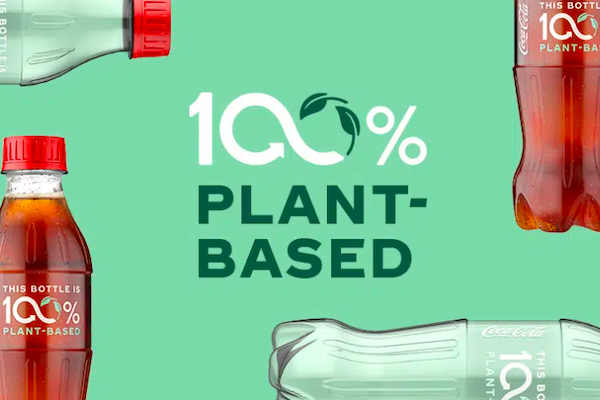Don't miss the latest stories
Coca-Cola Creates New Bottle Prototype Made Entirely From Plant-Based Sources
By Ell Ko, 23 Oct 2021
Subscribe to newsletter
Like us on Facebook

Image via The Coca-Cola Company
Coca-Cola is no stranger to exploring alternative packaging materials as part of its sustainability push; early this year, the company trialed a bottle prototype made of paper.
Now, it’s back to working with plastic—an improved version of it, at least.
With the new material, Coca-Cola is hoping to remove the need for petroleum from all commercially produced plastic bottles, not just its own. This means that the company will be making the technology available to others in the industry, including rival beverage companies.
“Our goal is to develop sustainable solutions for the entire industry,” explains Dana Breed, R&D Director of Packaging and Sustainability. “We want other companies to join us and move forward, collectively. We don’t see renewable or recycled content as areas where we want competitive advantage.”
Conventional bottles use PET, which is virgin oil-based. This new material is entirely plant-based, excluding the cap and label, and doesn’t require fuel.
How is this feat achieved, one may ask? Well, the bottle uses two technologies. One is a plant-based material called paraxylene (bPX), which was made with sugar from corn. This is then converted to terephthalic acid (bPTA).
The second is the conversion of used biomass to plant-based monoethylene glycol (bMEG). Before, bMEG was produced by converting sugarcane or corn into bioethanol before being made into bioethylene glycol. But now, sugar sources can directly produce MEG, removing the middleman and its associated emissions.
UPM, the technology’s first licensee, is reported to have plans to complete a full-scale commercial facility in Germany which will utilize hardwood feedstock from the wood industry in order to create more bMEG.
This, Coca-Cola declares, “marks a significant milestone toward the commercialization of the technology.”
Ben Jordan, senior director for environmental policy, shares more about bPET in an interview with Packaging Europe. According to him, the material is identical to the conventional PET in molecular structure. This means that it can be mixed with other traditional materials, including during recycling.
It’s reported that the company intends to “eliminate the use of oil-based virgin PET from plastic bottles altogether by 2030, using only recycled or renewable materials,” in Europe and Japan.
As part of our #WorldWithoutWaste innovations, meet our first-ever beverage bottle made from 100 percent plant-based plastic, manufactured using technologies ready to be commercially scaled.
— The Coca-Cola Co. (@CocaColaCo) October 21, 2021
Read the full story here: https://t.co/zjdWGbS464 pic.twitter.com/79Mhau40eR
[via Packaging Europe, image via Coca-Cola]
Receive interesting stories like this one in your inbox
Also check out these recent news





